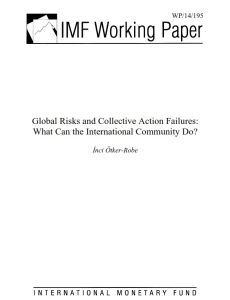Join getAbstract to access the summary!

Join getAbstract to access the summary!
İnci Ötker-Robe
Global Risks and Collective Action Failures
What Can the International Community Do?
IMF, 2014
What's inside?
Coordinating global cooperation to tackle global problems isn’t easy, but it is possible.
Recommendation
The fizzling of the Kyoto Protocol underscores the world’s desultory response to climate change. Depressing, yes, but don’t despair completely, argues economist İnci Ötker-Robe of the International Monetary Fund. Remember smallpox? If not, that’s because every nation in the world committed to eradicating it. The same held true for the hole in the ozone layer; nations agreed to take action to avert a crisis. While this timely report offers no easy answers, getAbstract recommends it to those seeking insights into collective global risk management.
Summary
About the Author
İnci Ötker-Robe is an adviser at the International Monetary Fund’s Monetary and Capital Markets Department.

















Comment on this summary